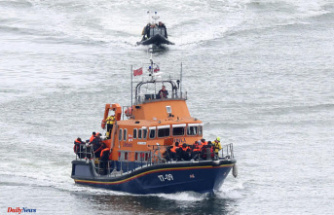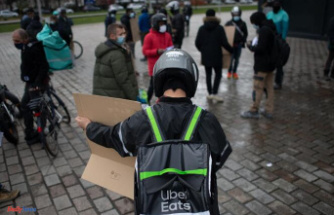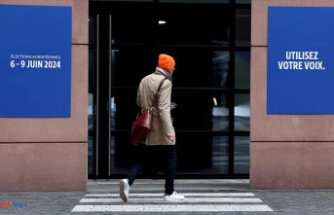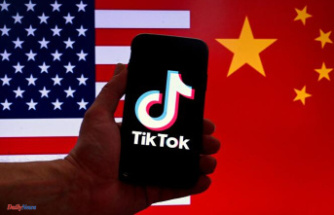Most people know Nicolette Krebitz as an actress from numerous cinema and television productions, including various "Tatort" episodes and the cult film "Bandits" from 1997.
The 49-year-old has long been writing screenplays and directing her own films. After the highly acclaimed "Wild" from 2016, the next Krebitz film about an unusual love is now in the cinemas with "A E I O U - The Fast Alphabet of Love". In an interview with ntv.de, the native Berliner reveals what fascinates her about the topic and why it is better when women tell stories about women.
ntv.de: In "Wild" it was the relationship between a young woman and a wolf. In "A E I O U" it's that of a seasoned woman to a much younger man. What fascinates you about such unusual emotional connections?
Nicolette Krebitz: I was probably unconsciously looking for an impossible love story again to get to the bottom of love. I brought two beings together again who supposedly have nothing to do with each other in order to tell as many new things as possible about them. Things that have changed because of the world we live in. If I had put a heterosexual man of the same age at Anna's side, not so much would have happened for me. I would have learned less about them and more about what our society is stuck on right now. This is how I learn something about a woman today and what this new, completely different male power can trigger in her.
You might have to ask Sophie Rois and Milan Herms this question, but how well did the juxtaposition of the two very different people in front of the camera work?
It was a surprising moment at the casting. After reading the book, Sophie wasn't sure if she even wanted to read it and if she believed this love story. But then something unforeseen happened during the test recordings. Milan wasn't the smaller, weaker part at all, he was keen to impress her and prove that he was capable of standing his ground. And that touched Sophie so much and created a certain transparency that I had never seen with her before. She suddenly had this kindness to respond to the echo he was creating in her. It was natural and organic.
So the Rois/Herms combination really only came about during the casting?
Exactly, when the two of them meet. After that it was clear that I would be stupid if I didn't try to get them both in the film. There was so much that was in history and had suddenly taken shape.
The cast could be described as a stroke of luck anyway. After all, you didn't come across Milan Herms in the files of an acting agency, but in the sauna.
It was in the thermal baths in the Europa Center in Berlin. (laughs)
Exactly where women over 40 like to approach young men...
(laughs) Yes. I wanted to go on a spa day with a friend. The sauna we were supposed to go to was closed though, so we ended up there. This is really a weird place. At the front is a huge smoking room, which I first thought was a hammam. (laughs) There's a bistro with filter coffee, beer and minced meat rolls... We didn't have a lot of saunas, we just had more fun. A boy and a girl lay across from us on the lounge chairs - like Christiane F. and Detlef. I immediately thought: this is how Adrian must be. A mixture of deviousness, Pasolini and this strong identity that he exudes. He's still young, but he already knows exactly what he wants... By the way, he wants to be a director himself.
And all of this was conveyed while he was lying on a lounger in a bathrobe?
Yes. I projected all of that onto him, at least right away. My girlfriend kept wanting me to talk to him and suddenly I was really scared that I'd never find him again once he left. So I walked over to the two and invited him to the casting.
Anna is significantly older than Adrian. But it's an age difference that doesn't get bogged down in the reverse constellation. Do you think that through films like yours, but also through people who set an example, there will one day be more equality here?
I believe representation makes a difference, images influence. That's why I really wanted to use this film to bring images into the world that open the eyes. I have noticed that there is almost hostility towards a woman's desires towards a younger man and that this is often defamed in the media. There seems to be an aggression, a fear.
The special field of tension arises precisely from the inequality of the two figures. What is different is interesting. Do you think that this can be a long-term relationship concept or does it only work for the moment?
I think it strengthens them that they both have to defend this love on the outside. There are now many couples in which the man is the younger part, they just don't announce it because it's still a taboo subject. In preparation for the film, I spoke to a lot of women who have much younger partners. Everyone said they wouldn't have entered into the relationship if the man hadn't been so insistent. For many it is the same as with the reverse constellation: the older partner is established, financially independent, the younger one has not really found each other yet. While this is true in many relationships, it is only addressed directly in those with such a large age difference, probably to question the authenticity of love.
Did that trigger something in you as well?
It also moved me to correct my own vision. Before that, when I saw a photo of a prominent man of a certain age who had a woman of the same age by his side, that struck me. I thought, 'Oh, that's old.' She was the same age as him. I guess I had a pretty degenerate look myself.
Let's turn to the realization of the film, which can be understood as a homage to the Nouvelle Wave. Did this idea come up early on or only during the preparation with cameraman Reinhold Vorschneider?
When I was planning the concept, I oriented myself towards French film. I could draw a comparison to the movies I like from the '60s, when women left the stove and filmmakers watched them curiously. What these women did was provocative, but they remained chic, dignified, and adorable through it all. These films are often ahead of today's view of them at that time. I figured if I'm going to tell a woman's non-reproductive desire today, that's a good trick. Giving them dignity on the outside and juxtaposing what they are experiencing with all the love scenes we know and love from past movies. Even if you initially frown on the age difference between the two, the form mollifies you. And in the end you don't even notice how you suddenly hope for the two of them.
You wrote the book, you directed it. According to the 2019/2020 diversity report from the Federal Association of Directors (BVR), the proportion of female directors in cinema productions is just 28 percent... So are there still too few women on the train?
I think a lot has already happened, a lot is changing and a lot of work is being done on equal opportunities - which gets on everyone's nerves, but is good for the industry. (laughs)
Do you think a story about a woman is different when a man tells it?
There are great films made by men about women, but I often find the space and care they give them more one-dimensional. Personally, I am now almost more interested in films by women, especially from Germany. They just make better films.
Nicole Ankelmann spoke to Nicolette Krebitz
"A E I O U - The slow alphabet of love" will be in cinemas from June 16th.












